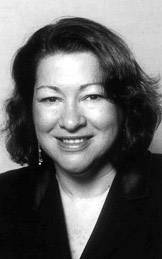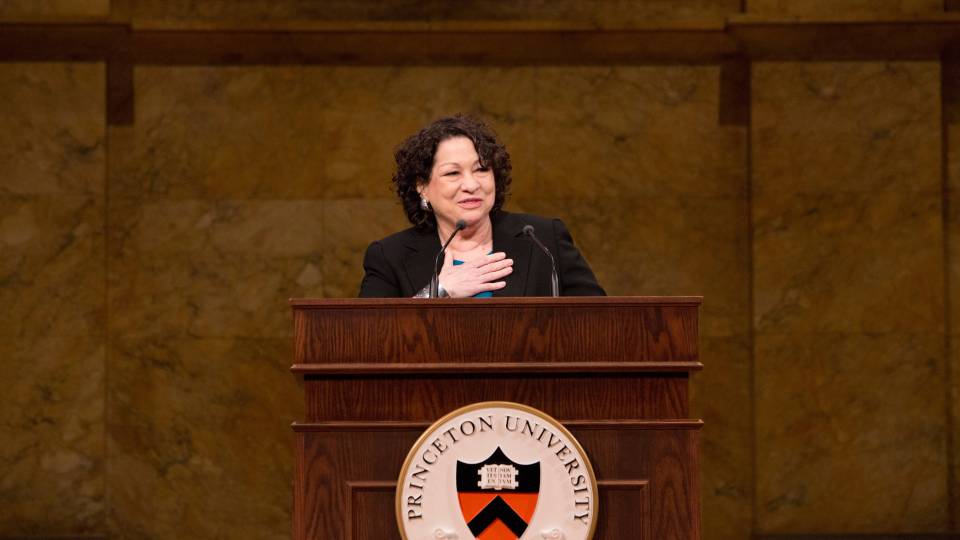The U.S. Senate Aug. 6 confirmed President Barack Obama's nomination of Princeton alumna and trustee Sonia Sotomayor to serve on the U.S. Supreme Court.
When she takes the oath of office in the next few days to fill the seat held by Justice David Souter, who retired in June, she will be the court's first Latina and third female justice. She also will be the first female Princeton graduate and the 11th Princetonian to serve on the court. A formal ceremony is expected to take place in September.
Sotomayor currently sits on the U.S. Court of Appeals for the 2nd Circuit. When Obama nominated her on May 26, Princeton President Shirley M. Tilghman said, "We are proud and delighted that Sonia Sotomayor has been nominated for the Supreme Court. As an undergraduate, Sonia was an excellent student and an exemplary University citizen, graduating summa cum laude and earning the highest award we confer for her strength of character and leadership. Eight years ago we presented her with an honorary degree and two years ago she became a Princeton trustee. She has brought to that role the same kind of insight, discernment, wisdom and good judgment that we are confident she will bring to the deliberations of the highest court in the land."

Sotomayor as winner of the Pyne Prize, the highest general distinction conferred on an undergraduate.
Sotomayor earned an A.B. with highest honors in history from Princeton in 1976. She also received the Pyne Prize, the highest general distinction conferred on an undergraduate, which is awarded to the senior who has most clearly manifested excellent scholarship, strength of character and effective leadership.
"I taught Sonia Sotomayor in the spring of her freshman year at Princeton in History 382, my course on the history of the United States in the 20th century," recalled Dean of the College Nancy Malkiel. "As a 300-level course, History 382 was normally taken by more advanced undergraduates; it was less common for freshmen to enroll. Sonia came to college with high intelligence and great ability, but without a very sophisticated grounding in the study of history. Over the course of that semester, I worked closely with her to help her develop the skills of critical reading of primary and secondary sources, analytic writing and historical interpretation that she would then practice regularly as a history major at Princeton.
"It was such a pleasure for me to watch Sonia grow and flourish at Princeton, not only over the course of the semester in which I worked most closely with her, but culminating with her graduation with highest honors, her election to Phi Beta Kappa and her selection as one of the co-recipients of the Pyne Prize," she said.
In a commentary in the July 9 Washington Post, Peter Winn, Sotomayor's thesis adviser at Princeton who now teaches at Tufts University, wrote, "Her thesis was extremely ambitious and one of the longest I have supervised, but it was the best paper she had ever written. I read it again recently, and I would still give it an A. It is clearly conceptualized, solidly researched, incisively analyzed, persuasively argued and very well written, with pithy summaries of her arguments that she could still be proud of today -- whether in a published article or a judicial opinion."
He added that much had been made of Sotomayor's comment "about the positive effect on her judicial decisions of being a 'wise Latina woman'.... Personally, I view the comment as a reference to the enriching impact of her life experiences on her work as a judge. Princeton played a key role in those experiences. It was there that she grew in confidence. It was there that she learned to read and write critically -- and her skills became equal to the best of her generation."
Sotomayor grew up in the Bronx and, after graduating from Princeton, attended Yale Law School, where she was editor of the Yale Law Journal. She began her legal career as an assistant district attorney with the New York County district attorney's office. In 1984 she joined the law firm of Pavia & Harcourt, and became a partner with a focus on international commercial litigation and arbitration of commercial and commodity export trading cases.
Sotomayor was appointed a U.S. District Court judge for the Southern District of New York in 1992 and was confirmed to the U.S. Court of Appeals for the 2nd Circuit in 1998. Her decisions include a 1995 injunction that ended an impasse between baseball owners and players, a reinterpretation of copyright law in the context of new media, and rulings in favor of public access to private information and in defense of religious freedom.
Sotomayor was presented with an honorary doctor of laws degree by Princeton in 2001 for her "wisdom and judgment that cross cultural boundaries." In 2007, she was elected to a four-year term on the Board of Trustees.
Sotomayor will join fellow Princetonian Samuel Alito Jr. on the high court, marking the first time two alumni have served together since 1860. The Princeton alumni who have served on the court and the dates of their service are:
• William Paterson, a member of the class of 1763, from 1793 to 1806.
• Oliver Ellsworth, a member of the class of 1766, from 1796 to 1800 (served as chief justice).
• William Johnson Jr., a member of the class of 1790, from 1804 to 1834.
• (Henry) Brockholst Livingston, a member of the class of 1774, from 1806 to 1823.
• Smith Thompson, a member of the class of 1788, from 1823 to 1843.
• Peter Daniel, a member of the class of 1805, from 1842 to 1860.
• James Moore Wayne, a member of the class of 1808, from 1835 to 1867.
• Mahlon Pitney, a member of the class of 1879, from 1912 to 1922.
• John Marshall Harlan, a member of the class of 1920, from 1955 to 1971.
• Samuel Alito Jr., a member of the class of 1972, from 2006 to the present.


